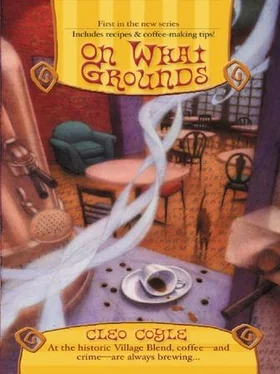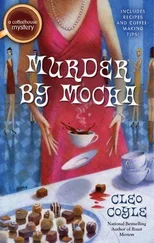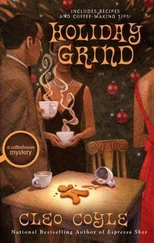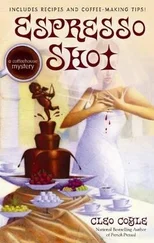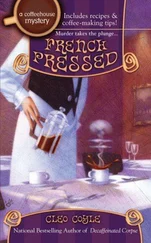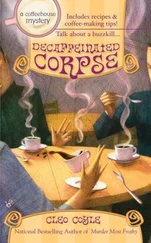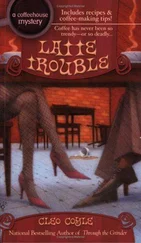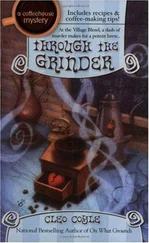As I finished making our drinks, Tucker put a New Age instrumental CD into the sound system. The mellow music was a tradition I had reinstated.
Before I’d returned to managing the Blend, Moffat Flaste, the previous manager, had driven customers away not only from his lack of attention to store hours, his improper cleaning of the espresso machines, and his laziness in keeping the seating areas tidy—but also with his exclusive and incessant playing of Broadway show tunes on the coffeehouse sound system.
As Madame put it: “How can one read, write, cogitate, or converse with Ethel Merman caterwauling in the background!”
Unfortunate but true. I mean, Broadway musicals are fine things, but their raucous tunes are distracting: worthwhile when ensconced in a velvet theater seat or cleaning the refrigerator, but downright irritating when trying to relax with a cup of cappuccino.
So about four weeks ago, on my first day back managing the Blend after more than ten years, I instructed the staff to return to the routine that the Blend had maintained for decades: classical, opera, and New Age instrumentals in the morning and afternoon; jazz and world music in the evening.
In less than a week, the old customers began to return. And with word of mouth traveling as quickly as it does in the Village, the customer base was now almost back to a profitable level.
“So where the hell did Matt go?” I finally asked Tucker.
He shrugged. “All I know is that he was helping me get ready to open when he said he’d be right back. He went up to the manager’s office, came back down about fifteen minutes later, said he had to take care of something very important, and left.”
“He said it was very important?”
“ Dire was the word Matt used.”
“Dire,” I repeated and took a fortifying sip from my cup. The stimulating warmth reached out to rally every weary nerve ending in my weary body.
Tucker had no way of knowing this, but dire was a loaded word for me, especially when it involved my ex-husband.
When we’d been married, and Joy was very little, Matt had described as dire the various “business networking” events that to me sounded more like they were ripped from a page of Hugh Hefner’s daytimer, e.g.: “It’s dire that I attend that club opening,” or “It’s dire that I stay in Rio another two weeks,” or “It’s dire that I accept that coffee broker’s invitation to his hot tub party.”
Eventually I realized my Peter Pan husband was simply dropping the letters es in the word desire to get the desired reaction from his little wifey, home taking care of the little daughter and managing the little coffeehouse.
I put up with it for almost a decade, mainly for Joy. But after a few major epiphanies in the wake of a few minor discoveries, I finally realized the fool I was and moved Joy and myself to Jersey, leaving a simple note behind: Dear Matt: It’s dire we divorce.
Thus ends my unhappy history with the D word.
Unfortunately, in this case, Matteo had not been exaggerating. What he’d discovered in the upstairs office was dire. But I wouldn’t find that out until I saw him later that day.
It was still early afternoon and a few surprises were about to come through my front door, starting with a cacophony of yips and barks attached to a stampede of long legs.
“I’m no wildlife expert,” quipped Tucker, his head deep under the counter, checking on supplies, “but that’s either a pack of roving hyenas or the Dance 10 crew.”
The herd of too tall, too thin, and too toned young women, and a few lean and muscular young men, stampeded through the door as if they’d been stranded for weeks on the Sahara and just discovered the great oasis.
Sporting leotards and water bottles, the chattering pack usually showed in the afternoons and evenings, during their breaks between dance classes or show rehearsals at the Dance 10 studio just a few blocks away—the same studio at which Anabelle Hart had studied.
“Tucker, do me a favor,” I said, watching them swarm the counter.
“What?” he asked. “Help you serve this rabble? You already pay me to do that.”
“No. Something else.” I often saw Tucker laughing it up with Anabelle and other groups from the studio—he was usually after the attractive male dancers, but that didn’t matter at the moment. Tucker was in the arts and close to their age, so many of the girls seemed to treat him as a trusted friend. He wasn’t a direct competitor for dance jobs, and because he was gay, he wasn’t going to become some sort of unwanted male pursuer. The perfect friend to confide in—so, I asked Tucker—“After they sit down, I want you to introduce me to Anabelle’s friends.”
“Her friends ?” Tucker raised an eyebrow. “Clare, among dancers that term is a fluctuating one at best.”
“Why?”
“Jealousy, of course.”
Nevertheless, Tucker did as I asked, calling me over after we’d served the group and they’d settled in at various tables.
“Come on over, C.C.!”
Actually, before he’d even called me, I had made a point of closely surveying the pack. Though I felt a little guilty for thinking it, Tucker’s comparing them with those hungry scavengers of the African veldt persisted—helped considerably by one girl’s zebra leotard and another’s leopard print headband and jacket.
They’d been in here many times before, laughing and whispering, gossiping and dishing, but I seldom made a point of listening to their conversations. (Most of my eavesdropping efforts leaned toward the older crowds—writers, painters, professors, and the occasional stock broker with a hot tip.)
Today, after lending an ear, I better understood Tucker’s “Wild Kingdom” comparisons. Why? Well, to start with, the dancers’ conversations included such genteel and eloquent remarks as—
“She’s a slut!”
“He’s a whore!”
“The bitch thinks she’s all that!”
“Can’t balance for shit—”
“No timing. No style. No talent!”
“I’ll break her legs before she upstages me again!”
And that was just in the first ten minutes.
“Hey, C.C.,” said Tucker, motioning me over to a table where five young women sat—three double tall lattes and two teas. He introduced me to the two teas first—
“This is Petra and Vita. They were both born in Russia and studied ballet in Moscow.”
Ahhh, I thought, that’s why the tea. Matteo had told me, after a trip to Moscow and Leningrad, that tea was the most popular nonalcoholic drink in that country, usually consumed during midafternoon breaks or after meals.
“Nize to met you,” said Petra. Her eyes were two black pearls and her straight black hair was cropped into a severe dominatrix-style cut. “You have nize place here,” she said. Her chin rose to gesture toward the end of the room. “Nize samovar, too.”
On the mantel shelf above the fireplace and next to Madame’s French lacquered coffee urn was an antique Russian samovar.
“Excuse me, but what’s a samovar?” asked one of the latte girls.
“It makes very strong tea called zavarka, ” said Petra. “It is Russian tradition to serve tea after supper. You clean supper table, put samovar in center of table, and whole family gathers round for tea.”
“How interesting,” I said, although I knew this already. I also knew, from one of Madame’s afternoon chats way back when, that the word samovar meant “self-heater” and the device was thought to be a modification of a Mongolian fire-pot, which had been used by the trans-Urals for cooking. With Petra’s haughty demeanor, however, I thought it best to keep my mouth shut and let Petra assume the role of expert.
Читать дальше
